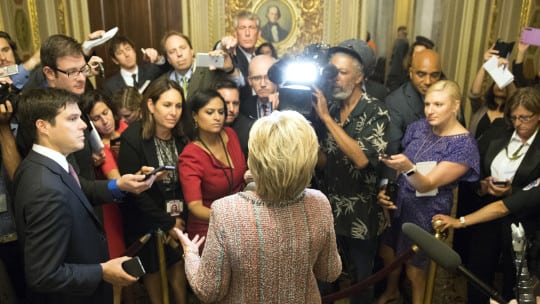
Let’s assume Hillary Clinton didn’t know Donna Brazile's article was coming. It’s hard to think that, of course. People rarely rise to Hillary Clinton’s level without having a network of supporters, friends and paid staff who alert you when something damaging may be coming in the press. Still, the article, published this morning in Politico, was bad enough to make any brand leader, senior politician or PR pro spew their breakfast coffee. (At the bottom of this article, we offer PR advice for Hillary Clinton. We're sure she'll send us a note of appreciation.)
It used to be referred to as a tell-all article. Now it’s called “gotcha” journalism. In any case the article, excerpted from a forthcoming book by former interim Democratic National Committee (DNC) chair Donna Brazile, is only a few paragraphs old when it takes healthy whacks at several high-level Democrats.
Her first target is Barack Obama: “President Barack Obama’s neglect had left the party in significant debt.” Then it's Brazile's party chair predecessor, Rep. Debbie Wasserman Schultz of Florida, whom she says was not a committed fundraiser. In addition, “Debbie was not a good manager...she didn’t come to the officers of the DNC for advice and counsel. She seemed to make decisions on her own and let us know at the last minute what she had decided….” Brazile saves her best punches for the Clinton campaign.
Brazile says she found proof during her stint as interim chair that the Clinton campaign rigged the nomination process. “By Sept. 7, the day I called Bernie [Sanders], I had found my proof and it broke my heart,” Brazile writes just five paragraphs into the article.
To be fair, it’s not an entirely new story. There were reports that Russians stole a cache of emails suggesting the Clinton team had rigged the nomination. Hard evidence, though, seemed to be lacking. The emails might have been forgeries. In the Politico article, though, Brazile insists she has “solid proof.”
One way the Clinton camp could contest the article is to point out that it is written in first-person format; there's no corroboration, it's purely Ms. Brazile's version of things. Next, Brazile is somewhat tainted. She was fired from her job as a CNN analyst when it was learned she shared with friends questions planned to be asked of candidate Clinton at CNN-sponsored events. Brazile took leave from her CNN position temporarily to accept the DNC job, an interim position.
In addition, the article could be seen as an attempt by Brazile to shift the conversation. If the DNC was broke, why didn't Brazile, a senior officer, know about it? In the article Brazile blames Obama and especially Wasserman Schultz for the financial situation, the latter for failing to tell senior officers what she was doing until she'd done it. Yet the fiscal health of an organization is supposed to be a senior officer's top priority. Were Brazile and her fellow senior DNC officials asleep at the wheel?
Still, what Brazile adds to the nomination-rigging story seems compelling. In a nutshell, the Democratic Party was broke and the Clinton campaign was keeping it alive financially. As such, it was calling the shots. “The campaign had the DNC on life support, giving it money every month to meet its basic expenses....”
Another significant issue, and one the Russian-hacked emails also intimated, was that the Clinton campaign, as Brazile writes, was “using the party as a fund-raising clearing house,” appropriating funds for itself that were meant for state parties.
Brazile writes she was boiling mad after realizing the financial mess she’d inherited. She vowed to make things right and promised Sanders she'd find out if the nomination of Hillary Clinton was rigged. “Did they think I would just be a surrogate for them, get on the road and rouse up the crowds? I was going to manage this party the best I could and try to make it better, even if [Clinton’s campaign]...did not like this.”
Eventually Brazile claims she found the hard evidence she needed in the form of the Joint Fund-Raising Agreement between the Clinton campaign and the DNC.
“The agreement…specified that in exchange for raising money and investing in the DNC, Hillary would control the party’s finances, strategy, and all the money raised. Her campaign had the right of refusal of who would be the party communications director, and it would make final decisions on all the other staff. The DNC also was required to consult with the campaign about all other staffing, budgeting, data, analytics, and mailings.
“The funding arrangement...was not illegal, but it sure looked unethical. If the fight had been fair, one campaign would not have control of the party before the voters had decided which one they wanted to lead. This was not a criminal act, but as I saw it, it compromised the party’s integrity.”
The question for PR pros, of course, is: What are Hillary Clinton’s next steps?
We asked D.C. insider Andy Gilman, president & CEO, CommCore Consulting Group, how he would advise Hillary Clinton this morning in 3 steps. Here’s what he said:
- Have a senior, known spokesperson issue a clarifying statement as to the campaign’s version of the facts.
- Develop a series of responses as this issue gets more public airing. I would not hold a press conference, but I'd prepare answers for Hillary Clinton to provide at any public meetings or events.
- I would also include in any response the need to address the other critical issue: the need for long-term solvency of the Democratic Party.
Follow Seth: @skarenstein
